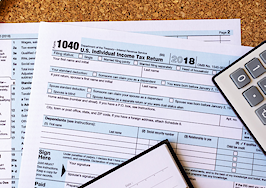
In challenging times, it’s a smart idea to revisit the fundamentals of good business. This April, go Back to Basics with Inman.
As the COVID-19 pandemic brings real estate to a halt in many parts of the country, agents are figuring out how to keep their businesses and families afloat. Many people are placing their hopes on the passage of the coronavirus stimulus package, which offers one-time direct payments to taxpayers, expanded unemployment insurance for independent contractors and $350 million to small businesses.
Although the federal government promises the payout of these benefits will be swift, three personal finance experts told Inman the key to short-term and long-term survival doesn’t lie with the government — it lies with making quick, smart decisions to slim your budget and maintain your cash flow.
“Don’t rely on the government for [help],” warned WealthAbility founder and CEO Tom Wheelwright. “Managing your cash flow is the key to surviving this from an economic standpoint.”
Here’s your 10-step plan for financially surviving the pandemic:
1. Streamline your budget

Joy Liu
For Financial Gym adviser Joy Liu, streamlining your budget is the first step in creating a financial plan that will help you and your business survive the pandemic. Liu suggests everyone prioritize their necessities and scrap things that are non-essential and that they’re unable to use due to social distancing orders.
“For example, if you have a gym membership, call your gym, and ask if you can pause payments,” she said.
Another area where agents can create some wiggle room is by slowing down their debt reduction plan. If you’ve been paying more than the minimum on your credit cards and student loans, Liu suggests stopping the extra payments and using that cash to cover immediate needs, such as your mortgage, rent, food and utilities.
From a business standpoint, WealthAbility founder Tom Wheelwright says real estate agents must determine which of their business expenses actually makes them money, and get rid of anything that doesn’t generate immediate income for them or their teams.
“If you have expenses that do not produce income and you can avoid those expenses, avoid those expenses,” he said. “For example, I have some marketing stuff that may be good, but it’s really longterm marketing. I may cut down [on that] because it’s not producing immediate cash, and that’s what I need.”
2. Separate personal and business expenses into two accounts to efficiently manage cash flow
Liu says entrepreneurs often have a difficult time balancing personal and business expenses because they keep them in the same account, which is a major mistake and prevents them from being able to properly budget and manage their cash flow.
If you haven’t already adopted this budgeting method, Liu suggested opening a business checking and business savings account at the same bank you use for your personal accounts. If you have any commission checks coming in, deposit them into the business checking account and then transfer a set amount into your personal account that acts as your biweekly paycheck.
“You’ll schedule an automatic transfer from your business account to your personal account twice a month or every few weeks, depending on how they want to do it,” she said. “It feels like you’re a regular, full-time employee, so you’re able to manage your money more smoothly since your income comes in large windfalls.”
If you’re having trouble figuring out what your “paycheck” should be, Liu said to pull at least three months of bank statements and separate personal expenses from business expenses. Calculate what you spend on personal upkeep and automatically transfer that amount from your business account each time you receive a commission.
“This [system] also informs how they set their own business goals, too,” Liu said. “This gives them a better idea of how many houses they need to sell per year to be able to afford their life. Then, they can adjust and optimize along the way.”
3. Negotiate, negotiate, negotiate!
In addition to cutting back on non-essential expenses, Liu, Wheelright and millennial financial expert Erin Lowry all suggest negotiating credit card, housing and utility bills to bulk up your cash reserves.

Erin Lowry
“You should continue making minimum payments due on debts, but you can also reach out to your lenders and creditors to see if they’re currently offering relief,” Lowry said. “Many banks and creditors are offering assistance in the form of deferred payments or waiving account fees.”
“Don’t just stop making payments without first having a conversation with your creditors,” she added. “Utility companies around the country have also stepped up to offer assistance and won’t terminate service to both individuals and small businesses that are struggling to pay bills. But you need to be proactive and discuss the issues before missing payment.”
When it comes to housing, Liu advises agents to take advantage of mortgage forbearance plans, such as the one offered by Freddie Mac and Fannie Mae. Renters, however, will have a harder time negotiating payments, especially if they live in a complex owned by a corporation instead of an independent landlord.
“But, it never hurts to ask,” Liu said while noting independent landlords may be more willing to negotiate, especially if they’re receiving a break on their mortgage payments.
If you’re not able to strike a deal with your landlord, Liu suggests researching your state eviction laws to determine if there’s a moratorium due to COVID-19. If so, that could give you some breathing room until you’re able to earn an income, either through a few remaining deals, a side job or unemployment benefits.
“Look for all the places where there’s some wiggle room and know that everything is negotiable,” Liu said. “Shift the power into your own hands and get creative.”
Lastly, Wheelright said agents should look into negotiating payments with their vendors, many of which have already rolled out steep discounts or free services.
“Real estate people are really relationship people, and I think that’s a huge benefit at this time,” he added.
4. Educate yourself about state and federal assistance aid, and gather paperwork so you can quickly apply
President Trump signed on Friday a $2 trillion coronavirus stimulus package into law, which will provide one-time direct payments to taxpayers making under $99,000 (couples’ limit is $198,000), unemployment benefits for independent contractors and loans for small business owners.
This package, along with state aid, will no doubt provide much-needed aid to agents and other entrepreneurs who are worried about their future. But, Wheelwright said only those who are prepared now will be able to take full advantage of the smorgasbord of benefits.

Tom Wheelwright
“While there’s $350 million available, if every business were to do this and qualify, it would be trillions of dollars,” he said. “So there’s not enough money for everybody, and I’m guessing only about 10 percent of people who need those loans will actually get those loans.”
Wheelwright said this is the time to reach out to your certified public accountant (CPA) and make sure you have the required paperwork to apply for loans and assistance. If you don’t have a CPA, Wheelwright noted plenty of accountants are offering free or discounted services alongside installment plans.
5. Reduce your No. 1 expense: taxes
Although much of the focus is on expanded unemployment benefits and business loans, Wheelwright said agents arguably have the most to gain from the coronavirus stimulus package’s tax provisions which include delaying quarterly tax payments until Oct. 15.
“Your biggest single expense are your taxes,” he said. “That gives you a window of opportunity to make that tax deferral permanent.”
“That would be a place where you could spend some money with your tax advisor and see if there are things you can do to reduce your tax bill either for 2019 or 2020,” he added. “We have three estimated payments coming due in October, maybe you won’t have to make them or maybe you can make a smaller payment.”
In addition to reducing or eliminating your estimated tax payments, Wheelwright said all real estate agents need to check in with their tax advisor to get a deferment on their self-employment tax.
“A lot of real estate agents are self-employed and a lot of them report their income on a Schedule C as a sole proprietor,” he said. “Under this new bill, 50 percent of their self-employment tax is going to be deferred for up to two years.”
“If they’re structured differently, it may be up to 100 percent,” he concluded. “This is again, where they’d sit down with their accountant and figure out how to change how they do business to take advantage of this new bill.”
6. Wisely dip into your emergency savings
Although help is on the way, it will still take a minimum of a month to roll out. If you’re part of the 20 percent of Americans who have at least $1,000 in an emergency savings fund, Liu said this is the time to use it.
“For people who have nice emergency funds, that’s a great place to be in,” she said. “This is exactly what the emergency fund is for.”
Before digging in, Lowry suggests examining your income and essential expenses and only using your emergency savings fund to fill in the gap, if there is one.
“We don’t know how long shelter-in-place orders, quarantine and a recession will last, so you want to be in conservation mode when it comes to your savings account,” Lowry said. “Use the bare minimum necessary, and aim to cut most non-essential spend out of your budget right now to ensure it can last.”
7. If you’re married (or coupled), shift financial responsibilities
“People tend to keep things separated and operate with their spouse more like roommates would, so they decide to split bills 50/50 or whatever is proportionate to their income,” Liu said. “In this case, it’s more important that you work together and get financially naked with each other.”
For couples who have a 50/50 arrangement right now, Liu suggests they consider shifting the financial balance where the partner with a full-time, salaried job takes care of all fixed expenses, such as the mortgage, rent and other bills.
“Assuming they have a full-time job where they pay is more consistent, I try to structure their budgets in a way where the steady income partner is able to cover fixed expenses, and then we give the person with the more variable income other goals to meet,” she explained.
The spouse with the variable income (e.g. you) will be able to beef up an emergency savings account and pay down debts, two things that will be helpful as an economic downturn looms.
8. Get a side job
Retail, chain restaurant and delivery giants such as Wal-Mart, Dominos, Doordash and Amazon are in a hiring rush. If you’re in a part of the nation that doesn’t consider real estate an essential service or has strict shelter-in-place measures that make it hard to do business, Wheelright said there’s nothing wrong with taking on a side job to keep your family and business afloat.
Delivery services, such as Shipt and Doordash, allow workers to create their own schedule, meaning agents can easily make deliveries when it’s most convenient.
“Anywhere you can find money, find it. You’ve gotta spend time on your business, but let’s look at reality. Don’t rely on the government for this,” he said.
9. Retool your business for ‘the new normal’
“Keep in mind that while some people in government think this will be over in three weeks, the reality is that this could easily [last] two years,” Wheelright said. “The real estate market it could be much longer than that because what we’re seeing in renters is that some rental properties are expecting that 50 percent of their renters will not be able to pay rent.”
“Well if they’re not able to pay rent, guess what else they can’t do: buy a house,” he said. “We’re going to see a big drag on real estate for a much more extended amount of time.”
To survive a downturn, Wheelwright said agents must use this time to rebrand and retool their business for future success, which will likely shift to a fully digital real estate transaction model.
“You have to look at, ‘How are we doing business?'” he said. “Business is never going to be the same because people are used to doing things remotely, people are used to doing things online. So when you look at your real estate business, this is a chance to retool and maybe pivot to a different type of way of doing business.”
After determining the best way to move forward, Wheelwright said agents need to review the suite of tools they use and figure out which ones to ditch and replace, if they have the extra funds.
“Assuming this goes two years, how do you see your business running and surviving for an extended period of time? And what will you have to do?” he concluded. “Look at creating a plan of action first, and then look at which tool is going to help you. Look at strategies first and tactics second.”
10. Seize a potential drop in home prices
The “r-word” is becoming more of a reality, Wheelwright said, while noting that home prices are likely to drop as the domestic and global economy slides. If you’re an agent who has the financial means, Wheelwright said this is the time to begin scoping for listings that you can snap up and eventually rent.
“We are going to see this decrease in purchase price on real estate. I mean, it’s starting to happen now,” he said. “There are going to be opportunities and who knows those opportunities first? Real estate agents.”













